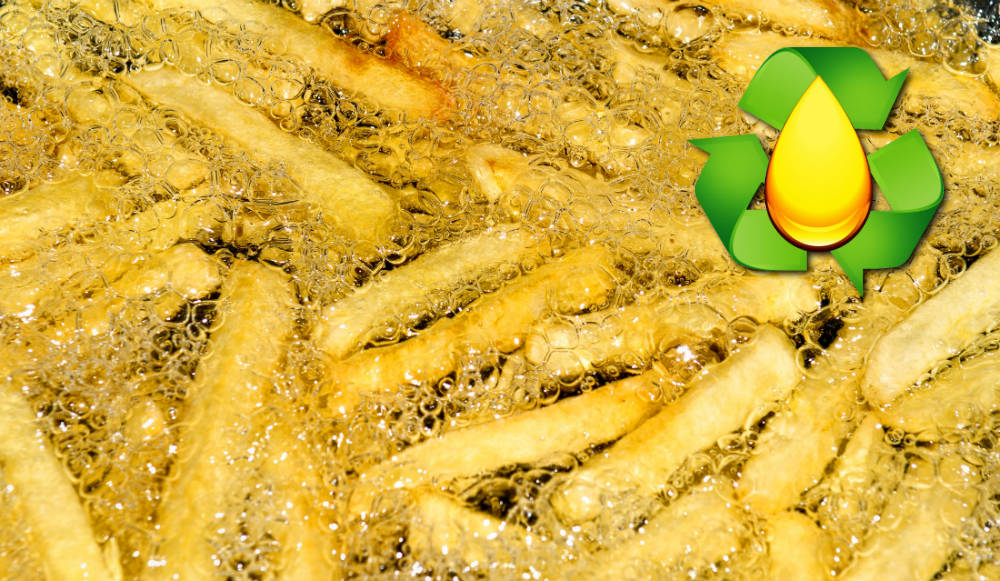Cooking oil is a waste present in practically all homes and commercial establishments that work with fried foods. When disposed of incorrectly, such as down sink drains or directly on the ground, frying oil becomes a major pollutant, causing serious damage to the environment, from clogging sewage systems to contaminating rivers and seas. However, collecting oil for reuse in biofuels as biodiesel is becoming an increasingly popular and effective practice, both from an environmental and economic point of view.
In this article, we will explore the path from oil collection from frying to its transformation into biodiesel, analyzing the benefits of this process for the environment, the economy and society in general.

The Problem of Improper Disposal of Cooking Oil
Improper disposal of cooking oil is one of the main challenges faced by waste management. It is estimated that millions of liters of used oil are dumped into sewage systems every month, causing:
- Blockages in sewage systems, which increases the maintenance costs of the sanitation system;
- Pollution of watercourses, since the oil forms a film on the surface of the water, compromising the oxygenation necessary for aquatic life;
- Soil contamination, which in the long term can negatively affect agriculture and the supply of drinking water.
A oil collection properly, it therefore becomes essential to mitigate these problems. Furthermore, this waste can be transformed into biodiesel, an alternative and sustainable fuel.
The Used Oil Collection Process
A oil collection frying waste begins with raising awareness among the population and establishments about the importance of disposing of this waste correctly. Collection is normally carried out in two main ways:
- Domestic collection: Many cities and organizations encourage families to store used cooking oil in PET bottles and deliver it to collection points or NGOs specialized in oil recycling.
- Collection at commercial establishments: Restaurants, snack bars and food industries, which use large quantities of oil, form partnerships with recycling companies or cooperatives that regularly collect this waste.
Once collected, the oil undergoes a filtration and purification process to remove impurities, such as food debris. This step is crucial to ensure the quality of the raw material to be transformed into biodiesel.
Reverse Logistics: How Oil Gets to the Factory
Reverse logistics is a concept that refers to the reverse path that waste takes until it is reintegrated into the production chain. In the case of frying oil, reverse logistics involves the collection, transportation and processing of used oil to transform it into biofuel.
This system relies on an efficient infrastructure that connects collection points (domestic and commercial) to biodiesel plants. Companies specializing in oil recycling act as intermediaries, ensuring that the waste is collected properly and transported safely to the processing plants.
Furthermore, reverse logistics for frying oil can generate jobs and new sources of income, especially for waste picker cooperatives and small collection companies.
The Process of Producing Biodiesel from Frying Oil
After the oil collection, the material goes through a transformation process that converts it into biodiesel. This biofuel is a renewable alternative to fossil fuels, helping to reduce greenhouse gas emissions.
The biodiesel production process can be described in three main stages:
- Filtration and purification: Used oil is filtered to remove solid residue and other impurities.
- Transesterification: This is the chemical process in which frying oil is mixed with an alcohol, usually methanol, in the presence of a catalyst, such as sodium hydroxide. This process converts the triglycerides in the oil into methyl esters (biodiesel) and glycerol (a byproduct that can be used in other industries, such as cosmetics).
- Final purification: The biodiesel produced goes through a final purification stage to remove any traces of glycerol and other contaminants.
After this process, biodiesel is ready to be used as fuel in diesel engines, being a cleaner and more sustainable option.
Benefits of Oil Collection and Biodiesel Production
A oil collection Frying oil and its conversion into biodiesel offers numerous benefits to the environment and society. Among the main benefits, we can highlight:
- Pollution reduction: Proper collection of oil prevents large amounts of this waste from being dumped into sewers and bodies of water, avoiding significant environmental damage.
- Reduced dependence on fossil fuels: Biodiesel is a sustainable alternative to petroleum-based diesel, helping to reduce greenhouse gas emissions and lower the carbon footprint.
- Circular economy: By transforming waste into a valuable resource, such as biodiesel, oil collection contributes to the creation of a circular economy, in which materials are reused and recycled instead of being discarded.
- Income generation: The collection and production of biodiesel can generate jobs, both in the collection and processing stages of the oil, promoting local economic development.
Challenges and Perspectives for the Future
Although the benefits of oil collection and biodiesel production are clear, there are still challenges to be overcome. One of the main obstacles is the lack of awareness among the population about the importance of correct disposal of oil. In addition, the infrastructure for collection and processing is still limited in many regions, which prevents the full potential of biodiesel from being explored.
However, the future of cooking oil recycling is promising. With the increase in environmental awareness initiatives and the strengthening of reverse logistics, it is possible that the production of biodiesel from used oil will become an increasingly common practice, helping to mitigate the negative impacts of improper waste disposal.
A oil collection The recycling of fried food and its conversion into biofuel are important steps towards a more sustainable future. In addition to reducing pollution and dependence on fossil fuels, this practice offers an opportunity to create new sources of income and strengthen the circular economy. By raising awareness about the importance of collecting and reusing waste, we can contribute to a cleaner and healthier planet.
Check out other interesting facts about recycling clicking here.
Learn how to make art by recycling, Click here.



